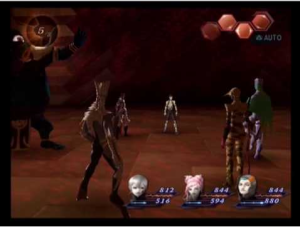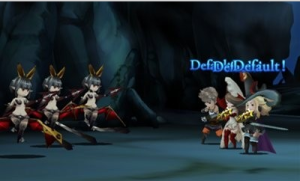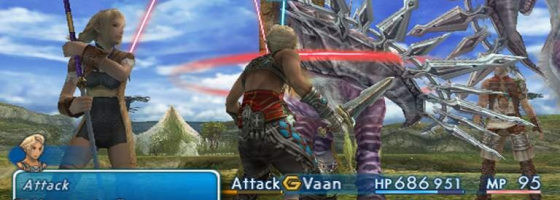Playing through Bravely Default, I loved a lot about the game’s approach to class design and the combat system. However, certain elements held over from old school design I felt hurt the system from reaching greatness and it had to do with boss design.
Boss design in RPGs is a tricky concept as it’s about finding that right balance between challenge and just being mean to the player.
Numbers of Death:
RPG boss fights or RPG design in general is interesting and tough to examine, as the systems are completely abstracted and remove from the player’s interaction for the most part. As in, it doesn’t matter how quick my reflexes are or pattern memorization, as they won’t help me when the boss uses a group hitting skill that does 9999 damage.
This means everything is determined by the systems and rules that are in place. And makes it very difficult to critique or answer the question of this post: How do you make good boss design?
The problem is that difficulty is not always a good benchmark, just because something is difficult doesn’t mean that it’s not balanced by the rules in place. For me, I have several characteristics that I look for in determining the balanced behavior of a RPG’s systems or boss fights.
First is whether the boss fights are designed around “one way combat”, meaning that there is only one specific way or tactic that will easily win the fight. Granted, bosses are one-offs by the fact that they are unique enemies, but that doesn’t mean that there should be only one way to fight them or succeed.
Despite my love of the Etrian Odyssey and Shin Megami Tensei series, they both are guilty of this. In the first EO game, the optional boss fights were dragons that each had a super power elemental attack. It was absolutely required to bring a protector who could put up an elemental shield to have any chance of winning.
With Shin Megami Tensei: Digital Devil Saga, the final optional boss literally required a list of specific actions to take. As deviating in any way, the boss would attack you with a skill that did more damage than your actual max health.

This final optional boss required an exact guide to each round to stand any hope of winning and was an extreme example of one way combat.
One way combat is incredibility boring and just increases the amount of grinding that someone would have to do to beat the game.
Next point is one that a lot of JRPGs are guilty of: False Choices in design. A false choice is an option or mechanic that really doesn’t work within the rules of the game. And its existence is essentially a red herring and will not help the player, such as having a “luck” attribute that doesn’t do anything.
False choices are poor design and are either from the designer not properly balancing the game or just seeking to add content for the sake of content. JRPGs are very bad at this, especially older ones like Final Fantasy, Dragon’s Quest and so on. What they did was give the player a variety of status aliment causing skills like confusion, blind, poison etc to use on the enemies.
However, normal enemies would fall quicker to regular damage and bosses were innately immune to them. This meant that the vast majority of abilities outside of direct damage were really useless and made the actual gameplay far smaller than at first appearance. While enemies were able to use them on your party for greater effect, especially boss fights.
You can also see this in class based RPGs where there can be “joke classes” like jester, fisherman and so on, that are there to really just confuse the player and serve no purpose compared to the other combat oriented classes.
The simplest way to avoid this trap is that every skill that you design in the game should be balanced to work on any enemy. That way, all the skills have utility and add depth to the combat system. The best thing that I loved about the Etrian Odyssey series, that it was the first RPG that I played where all those nasty status aliments could be used on the enemies and bosses.
The first time I completely shut down a boss with binding skills to have it unable to attack was an awesome experience. Or in Persona 4, using debuff skills to weaken the final boss to the point that it was an easy fight.
Sometimes less is more and it’s better to have 10 fully integrated skills and attack types rather than having 20 with only 10 that actually work.
What makes boss design in RPGs difficult is that by nature they are one off fights that are supposed to be unique, but you have to be careful with how far you stretch things. The two extremes of boss design can either go as a puzzle, where the boss requires you to figure out the right time to attack or play by different rules. Or a straight up grudge match where it comes down to who can hit the other team the hardest first.

Bravely Default features a wide variety of classes, but the skills available that are useful for combat are limited.
Either extreme is really not good design in my opinion, the former because you’re effectively breaking your entire system and rules for a single fight while the latter offers no other strategy than making sure you keep up with healing.
That’s where having a variety of viable skills comes in handy, as you can then challenge the player to deal with a boss with unique attacks while making use of your own abilities. So instead of it being a one sided fight, it becomes a battle of who has the better strategy and skill composition.
Lastly, I want to point out one annoyance that I see in RPG design, difficulty levels and how they impact boss fights. The problem with having difficulty settings in most RPGs is that they don’t make the game more engaging to play, but simply increase the grind factor. Instead of having to figure out how to fight a boss strategically, it becomes a game of grinding away battles until you hit that magic level that you can take them down.
Unless you explicitly reward the player for playing on hard or have unique challenges available, I prefer RPGs with just one difficulty level or the addition of a “beginner” difficulty for new players or those that become stuck.
Most RPGs are content with just using the basic system seen in games like Final Fantasy and Dragon’s Quest and while they are still popular, they are somewhat monotonous. Well designed RPGs requires both an understanding of the mechanics at play and being able to properly challenge the player without it turning into a numbers fight.
Lastly, if you are interested in some RPGs that are more about challenging the player with their systems, the Shin Megami Tensei brand, Etrian Odyssey and possibly the upcoming game The Darkest Dungeon are great examples.


